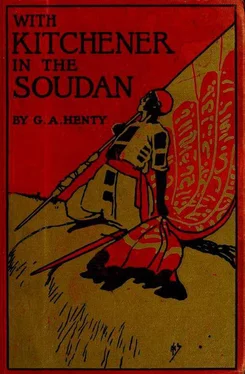" I have sworn an oath," Mahmud said gloomily.
" But you have not sworn to slay instantly. You can keep them at least until you can take them before the Khalifa, and say to him: 'Father, I have sworn to kill unbelievers, but these men have saved Fatma's life; and I pray you to absolve me from the oath or order them to be taken from me, and then do you yourself pardon them and set them free for the service that they have rendered me'. If he refuses, if these men are killed, I also swear that as my life is due to them, I myself will perish by my own hands if they die for saving it!'"'
" It needs not that, Fatma. You think that I am ungrateful, that I do not feel that these men have acted nobly thus to risk their lives to save a strange woman whose face they have never seen. It is my oath that lies heavily upon me; I have never been false to an oath."
"Nor need you be now," Fatma said earnestly. "You swore to slay any unbeliever that fell into your hands. This man has not fallen into your hands. I have a previous claim to him. He is under my protection. I cover him with my robe" —and she swept a portion of her garment round Gregory— "and as long as he is under it he is, according to tribal laws, safe even from the vengeance of my husband! As to the other, he is not an unbeliever. Your oath concerns him not. Him you can honour and reward according to the value you place upon my life."
The Arab's face cleared. " Truly you have discovered a way out of it, Fatma, at any rate for the present." He turned to Gregory for the first time. " Do you speak our tongue ?" he asked.
"Yes, Emir, as Avell as my own."
" Then you understand what we have said. Had I not been bound by my oath I would have embraced you as a brother. We Arabs can appreciate a brave deed, even when it is done by an enemy. When one of the boatmen ran into the battery where I was directing the guns against your boat, and said that the boat in which my wife with other women were crossing had been sunk by a shell from our batteries on the other side, I felt that my blood was turned to water. He said he believed that all had been killed or drowned, but that he looked back as he swam and saw a white man jump overboard, and a short time after another followed him, and that when he reached the shore they were supporting a woman in the water. I rode hither, having but small "hope indeed that it was my wife, but marvelling much that a white officer should thus risk his life to save a drowning woman. My oath pressed heavily upon me as I rode. Even had it been but a slave girl whom you rescued, I should no less have admired your courage. I myself am said to be brave, but it would never have entered my mind thus to risk my life for a stranger. When I found that it was my wife who was saved, I still more bitterly regretted the oath that stood between me and her preserver, and truly glad am I that she has herself shown me how I can escape from its consequences. Now I see you I wonder even more than before at what you have done, for indeed in years you are little more than a boy."
"What I did, Emir, I believe any white officer who was a good swimmer would have done. No Englishman would see a woman drowning without making an effort to save her, if he had it in his power. As to the fact that she was not of the same race or religion, he would never give it a thought. It would be quite enough for him that she was a woman."
" And you," Mahmud said, turning to Zaki; " you are a Jaalin, are you not ?"
"I am."
"Jaalin or Baggara, you are my friend," Mahmud said, placing his hand on Zaki's shoulders. " And so you, too, leapt overboard to save a woman?"
"No, Emir," he replied, " I jumped over because my master jumped over. I had not thought about the woman. I jumped over to aid him, and it was to give him my help that I took my share in supporting the woman. The Bimbashi is a good master, and I would die for him."
Mahmud smiled at this frank answer. " Nevertheless, whatever may have been your motive, you were enabled to save the life of my wife, and henceforth you are my friend." Then he turned to the horsemen who were still grouped on the bank above. " You have heard what has been said? The white man is under the protection of my harem ; the Jaalin is henceforth my friend."
Mahmud was a fine specimen of the tribesmen of the Soudan—tall, well-built, and with pure Arab features. He was the Khalifa's favourite son, and was generous, with kindly impulses, but impatient of control. Of late he had given way to outbursts of passion, feeling acutely the position in which he was placed. He had advanced from Omdurman confident that he should be able to drive the infidels before him and carry his arms far into Egypt. His aspirations had been thwarted by the Khalifa. His requests for stores and camels that would have enabled him to advance had been refused, and he had been ordered to fall back. His troops had been rendered almost mutinous from the want of supplies. He had seen the invaders growing stronger and stronger, and accomplishing what had seemed an impossibility —the bringing up of stores sufficient for their sustenance—by pushing the railroad forward towards Berber. Now that their forces had been very greatly increased, and the issue of the struggle had become doubtful, he had received the order for which he had been craving for months, and had been directed to march down and attack the Egyptian army, drive them across the Nile, and destroy the railway.
By means of spies he had heard that ere long a large force of British soldiers would come up to reinforce the Egyptians. so that what might have been easy work two months before, had now become a difficult and dangerous enterprise. The manner in which the Dervishes had been defeated in their attacks upon Wolseley's desert column, and in the engagements that had since taken place, showed how formidable was the fighting power, not only of the British troops, but of the native army they had organized, and his confidence in the power of the tribesmen to sweep all before them had been shaken.
The Dervishes scowled when they heard that they were not to have the satisfaction of massacring this Englishman whose countrymen were still keeping up a terrible fire on their redoubt. It was not one of their wives who had been rescued, and Gregory's act of jumping overboard seemed to them to savour of madness, and if that plea had been advanced they would have recognized it as rendering the person of the man who had performed it inviolable. However, as he was under the protection of their leader's harem there was nothing more to be said, and at an order from Mahmud all but four of them rode off, while the others fell in behind him. Mahmud did not mount again, but walked with his wife to a deserted mud-hut two hundred yards away. There he left her, telling Gregory and Zaki to sit down outside, and placing the four men on guard.
"I must rejoin my men," he said as he mounted. "When your vessels have gone I will return."
Half an hour later the fire ceased. Soon afterwards Mahmud rode up with a score of men, followed by some dozen women, and a slave leading a donkey. On this Fatma took her seat, and the women surrounded her. Gregory and Zaki walked close behind them; Mahmud, with his horsemen, rode in front. After proceeding for a mile they came upon a group of tents. Mahmud's banner was flying on a pole in front of the largest of these. Behind, and touching it, was another almost as large. This was the abode of the ladies of Mahmud's harem; the other tents were occupied by his principal Emirs. A hundred yards away was the encampment of the army, which was sheltered in hastily-constructed huts, or arbours made of bushes. By Mahmud's order a small tent was erected with blankets close to the after-entrance into the harem tent, for Gregory's use, so that, should he be attacked by fanatics, he could at once take refuge in the harem, whose sanctity not even the most daring would dare to violate.
Читать дальше












